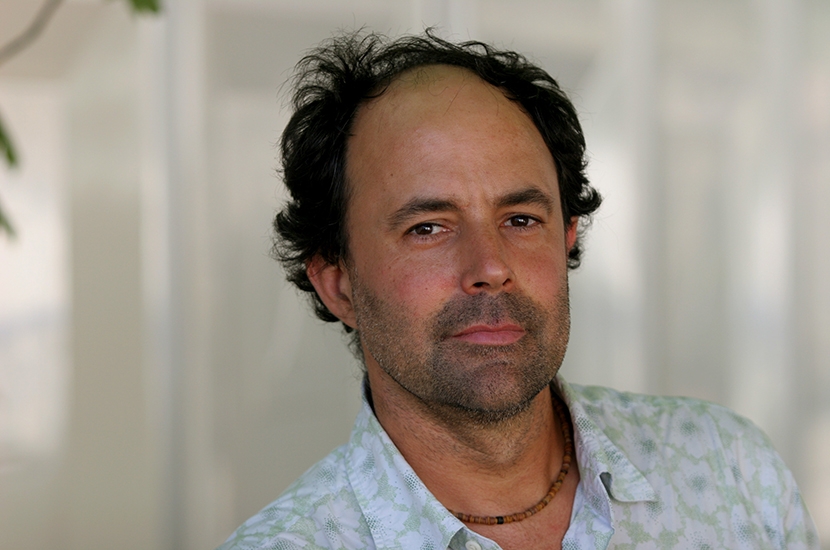For eight years I rented a small house in Oxford overlooking the canal. The landlord, a poet and novelist younger than myself, had moved with his family to New Mexico. At his desk I managed to write three books, beneath shelves containing editions of his work. I can’t explain why it took me so long to reach up and open those books, but when I finally did, it was extraordinary to discover how similar were our trajectories: same prep school and university; two young sons; novels set in North Africa and Peru; a gap year working on an Argentine estancia.
Until that moment, I had cultivated a self-protective disconnect with my landlords, hardly unique, indeed part of a tradition — rather like V.S. Naipaul behaved towards Stephen Tennant when living in Wilsford. I now thirsted to know more. Almost as surprising to learn was that Henry Shukman had been meditating on a mountainside in Santa Fe during the years I sat working in what had been his former ‘refuge’, as Buddhism calls it. Not only that, he had since become a Zen master. While I was realising correspondences at his old desk, he was rapidly erasing them, as if engaged in brushing the path clear. How he discovered and followed his path is the subject of this memoir.
The author’s background is illuminating, not least since it’s the subject of a 3,000-page ‘family novel’ that he worked on for 30 years and then, like a Sisyphean burden, discarded in favour of writing One Blade of Grass. Henry, the younger brother of the BBC science editor David, is the ‘rationalist’ son of two Oxford academics who were trained as spies. His professor father, Harold, was from a family of East European Jewish tailors who arrived in England as penniless refugees. His mother, Ann, came from a family of lawyers, and was ordained one of the first female Anglican priests.
From childhood, Shukman suffered from eczema, a consuming condition that left his mind with ‘no space for anything that might not help its constant endeavour — to escape the present itch’. He was a boy when his father announced that he was separating from Ann. While everyone else sobbed, Shukman sat in a ‘glassy daze’, furiously scratching his hot, tight sores as if to bury the greater lesion; vividly, he describes his skin like wet canvas — ‘where it tore, the flesh was granulated like sausage meat’.
Months later, his father delivered a second blow: he was marrying Ann’s first cousin. Shukman, hating the remarriage from the outset, was overwhelmed by ‘the misguided longing to split up my father and stepmother, so I could restore our family’. If his memoir has a unifying theme it is that of restoration, although not of the kind he anticipated.
Stone-cold sober, at the end of his gap year, he experiences his first restorative ‘awakening’ when, alone on a South American beach, he sees an old fishing boat dissolve in a blinding light that reflects off the sea. His first of many attempts to describe the impact of this brilliance is as good as any: ‘It was inside him. Or he was inside it, as if he’d stepped into the scene and become part of it.’ Time, space, the beginning and end of everything were there, and they were also Henry Shukman. ‘Suddenly, he knew why he had been born: it was to find this. This reality.’ He did not believe in God. He craved ‘a clear, non-theistic’ explanation for what had hit him on that beach, aged 19. ‘And not just an explanation, but a directive for revisiting it.’
The next 30 years is a road full of pot-holes: a ‘lone-wolf’ freelance existence as a travel writer, self-described arrogant prize-winning poet and novelist. He has affairs with hash, alcohol and ‘a sensitive goddess from Wisconsin’ before settling down with Clare, a clear-eyed printmaker from Warwickshire. They buy the house in Oxford that I was to rent, and there, in the bedroom, while watching Who Framed Roger Rabbit, Shukman has another epiphany — a thunderclap ‘outside all calculation’. In that flash, he recognises, as he puts it without irony, that ‘I was a child of the universe’. ‘Oh God,’ groans his wife, looking up from the bed and seeing him laugh, ‘it’s not that Zen again.’
By now Shukman has been going on Zen retreats four times a year. It’s the only time his itching stops, as he sits still and meditates. The same vanishing of the ego that others experience in fishing or drawing or marathon-running he finds when sitting cross-legged on a mat, facing a wall and breathing. But how to communicate this ‘fizzing peace’, as he nicely puts it, other than in metaphors, or ‘koans’ — his teachers’ word for the riddles that try to explain the process of revelation? ‘One of the unfortunate attributes of “mystical experience” is that if we hazard an attempt at describing it — or if I do — we can’t help but tumble into cliché.’ Shukman is aware that his efforts to translate his ‘thunderclaps’ into language risk making him sound like Les Crane reciting ‘Desiderata’ to the ululating accompaniment of a trio of Leonard Cohen beauties. But he persists nonetheless, until the moment arrives, after his father dies, when he stops writing and scraps the family novel: ‘The world was one luminosity. What could a book matter?’
Luckily for us, Shukman does not side with E.M. Forster, that ‘a perfectly adjusted organism would be silent’, but with the more constant poet in him who agrees with Shakespeare’s Ulysses — that ‘one touch of nature makes the whole world kin’. Appearing to enact one of his koans, Shukman gives up writing in order to write. It’s a measure of the gifts he thought he had turned his back on that we care so much about his bumpy journey.






Comments